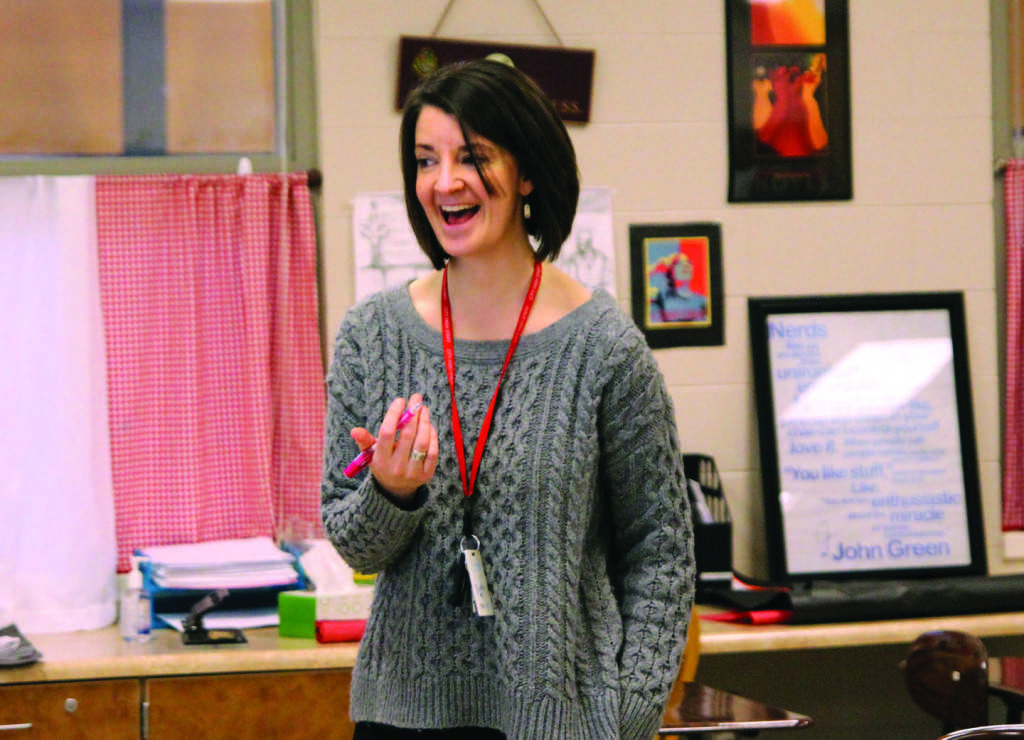Your donation will support the student journalists of Iowa City High School. For 2023, we are trying to update our video and photo studio, purchase new cameras and attend journalism conferences.
Ms. Fettweis teaching an honors English course.
Plagiarism Goes to the Heart of Integrity
January 24, 2014
Last fall, when Senator Rand Paul (R-KY) faced repeated charges of plagiarism, he suggested that he’d like to end the discussion by challenging his critics to a duel. Rand eventually backed down and acknowledged he’d relied far too heavily on unacknowledged sources’ language. But I still couldn’t get past his seemingly harsh reaction–a duel? Seriously? This kind of defensiveness reminds us what a serious issue plagiarism is. It goes directly to the heart of a person’s integrity.
Around the same time Sen. Paul was wishing he could settle his problems with pistols, City High purchased a subscription to Turnitin.com, a website that helps teachers and students detect plagiarism. When I told one of my classes about this resource, they reacted as if I had challenged them to a duel: they were defensive, scared, even angry about the implicit implications of this program.
Sure, we want to bust blatant plagiarists. But what I tried to assure my students is that this is a tool to help them detect citation errors before a draft is final. After using it this week, they finally believe me. Many were delighted to realize how they effectively synthesized research in their original arguments. If a student relied too heavily on a source, Turnitin showed the student the original source. By seeing sources next to their texts, students got the best possible lesson about how to effectively paraphrase. It’s not a “gotcha” device; it’s a learning tool. I may be naïve, but I believe most students don’t set out to participate in the kind of plagiarism that is most egregious–the kind where a student copies ideas from the internet, pastes them into a Word document, and attempts to pass those stolen words off as the student’s work. That kind of cheating is beyond lazy; it’s foolish. With a five second Google search, the teacher can bust the plagiarist. Duel over. Teacher wins.
The far trickier plagiarism cases, and I hope the far more common ones, happen because students have at their fingertips access to a world of ideas. Often, those ideas have been written by people who are experts in a field. When students see these on-line ideas, they think, “I can’t say that any better.” Inadvertently, students parrot phrases and ideas from internet sources. What students need to know is when and how to give credit to those sources. The conversation about plagiarism, then, needs to move out of the confrontational and into the instructional.
Yet I find myself getting frustrated when I see that students have used on-line summaries or guides to generate their responses to a text. This, too, is plagiarism, after all. I don’t think students do this because they want to cheat or buck the system; they do it because they, like everyone else in the world, don’t like feeling dumb. They just want to know, for example, what the heck a poem is really about. Students think citing that source shows they’ve “cheated.” Often, I have to remind myself of my core belief: my students are honest, decent people who want to do well in school. They see the internet as a tool to help them succeed. And they are right—it is almost unfathomable what the web can do. Is the internet a crutch for the lazy sometimes? Sure. Reading closely and thinking hard presents unavoidable challenges. Using the internet allows people to sidestep those challenges. I just wish City High students realized that what they have to say about issues or texts is far more interesting to most teachers than the “right” answers from the internet.
Plagiarism is an incredibly serious issue. Students who plagiarize in college can get expelled; musicians can get sued; senators can lose their credibility. I’m grateful for City High’s investment in a learning tool that helps students learn to research more effectively. It has helped remind me that we should be discussing how to avoid plagiarism, not dueling over it.
